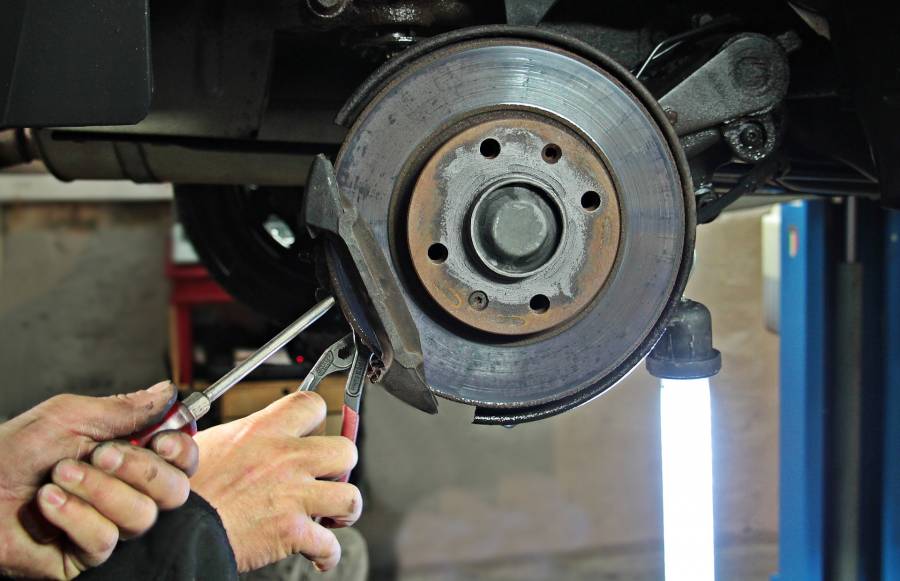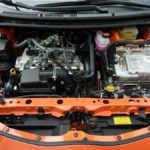Quick Navigation
Low braking power should be a significant concern. It is because the braking system plays a vital safety role in your car!
For instance, a low braking power might make your car hit other vehicles when trying to stop it.

It can result in damages to the car’s components forcing you to incur a lot of money in repairs.
Therefore, knowing why it happens and how to fix it will come in handy when you run into it, especially when far away from the garage.
Below are the things you should examine and fix when encountering low braking power.
The Brake Fluid Is Low
The brake fluid transmits the braking force from the pedals to the wheels. It is located in a brake line that connects to all the wheels.
These brake lines are made of steel; hence they are prone to corrosion. Extreme corrosion will create tiny holes in the brake lines letting out the brake fluid.
If the brake fluid goes low, the braking force that reaches the wheels will be small.
Consequently, you will experience a low braking power displayed on the car’s dashboard. By topping up the brake fluid, you will boost the brake power.
However, this is a temporary fix since you haven’t fixed the holes in the brake lines.
So, it would be best to repair the holes or replace the entire brake line to avoid top the fluid now and then.
Clogged Or Bent Brake Line
The brake fluid should flow freely in the brake lines to generate optimal braking power. However, the brake lines can get bent due to accidents.
Also, overheating, the brake fluid can burn and turn into a solid substance that clogs the brake lines.
Such events will interrupt the flow of the brake line resulting in low braking power.
The good thing is that flashing out the impurities in the brake lines will eliminate the problem.
But if the brake line is bent, it is advisable to replace it with a new one since bending it back might break it or make it weak.
Presence Of Air In The Brake Lines
Air in the brake lines is another thing you should be wary of when you feel low braking power.
Air can enter into the brake lines in various ways, such as during maintenance. Also, the brake fluid tends to absorb atmospheric water, which reduces its boiling point.
As a result, it boils, resulting in water vapor. As you might know, water vapor is made of oxygen.
This oxygen will occupy the space in the brake lines, making them feel soft. Fortunately, you don’t have to take the car to a mechanic to fix this problem.
All you have to do is flush the brake fluid, a process called bleeding that will eliminate the air in the brake lines and restore the optimal braking power.
Faulty Vacuum Pump
The role of the vacuum pump is to remove the air in the vacuum booster, thus creating a vacuum.
This vacuum will enable you to maximize the brake power, hence needing less effort.
If the vacuum pump fails, you will experience low braking power, especially when you don’t apply a strong force to the brake pedal.
Fortunately, you can quickly diagnose if the vacuum pump is faulty using a vacuum gauge. But when doing so, make sure you use your car’s manual to avoid making errors.
If the vacuum pump is causing5 low braking power, replace it immediately since it is a severe safety issue.
It would be best to let a professional fix it for you since it ought to be done correctly.
Faulty Master Cylinder
Like the brake lines, the master cylinder performs a critical function in your car.
It is responsible for holding the hydraulic fluid and producing hydraulic pressure, which aids the braking system.
However, it can also wear out due to mechanical damages or old age. When it does, it will leak out the brake fluid.
It will also encounter a reduction in its hydraulic pressure. These two scenarios will lower the braking power.
Luckily, the check engine will show the part that has gone bad. This part needs to be fixed to improve the braking system’s performance.

Worn Brake Pads
The brake pads are the components that press the disc rotors, resulting in friction, which leads to the car’s stoppage.
Therefore, for the braking system to have maximum power, its brake pads should be good.
Unfortunately, since the brake pads are exposed to friction every time they press onto the rotors, they tend to wear out over time.
But it is worth noting that the extent of the wear depends on its material and the way you drive the car.
To test if the brake pad is worn, measure the thickness of its material and compare it with the correct thickness.
A brake pad that is severely worn won’t exert enough fiction on the rotors. It will translate to your car’s low braking power when you press on the brake pedal.
That being the case, if the thickness of the brake pad has been reduced, replace it immediately to sort out the braking problem.
Faulty Valve
The vacuum booster has a component called the brake booster check valve.
This valve performs three vital roles in the braking system, including removing pressure buildup, eliminating air in the master cylinder, and maintaining a vacuum.
These roles ensure optimal braking power. Therefore, if the valve gets faulty, the vacuum in the brake booster will be eradicated, resulting in low braking power.
Although this valve is designed to last the lifetime of your car, specific mechanical issues can damage it.
If you encounter a spongy brake pedal followed by an engine stall, you have a faulty booster check valve that needs to be replaced.
Unfortunately, this feature is located deep inside the car; hence you might need an expert to help you access it.
The Electronic Control Module (ECM) Has Malfunctioned
Modern cars have their braking system controlled by the ECM. Therefore, the ECM will increase or lower the braking power depending on pressing the brake pedal.
But sometimes, the ECM malfunctions, and instead of increasing the braking power, it lowers it.
So if all the other components are exemplary, you should check the state of the ECM.
In some instances, the problem is due to a software issue in the ECM, and restarting it will sort it out.
The Antilock-Braking System (ABS) Has Been Activated
The ABS is only supposed to be activated when braking at high speed. It regulates the braking power by controlling the opening and closing of booster valves.
However, it can malfunction and activate itself even when driving at an average speed.
Luckily, it’s easy to spot a failed ABS since its performance will not be felt when braking heavily. So, repairing it will get rid of the low braking power.
But it would be best if you let a professional handle it for you since the ABS is a complex component that needs excellent technical know-how.
Faulty Speed Sensor
The speed sensor collects the wheel’s speed information and sends it to the ECM and ABS. As a result, the braking power produced depends on its information.
Therefore, if the speed sensor malfunctions, it will not send such information to the two components. It can also send wrong information.
For instance, when you reduce the wheel’s speed by pressing the brake pedals, the faulty sensor might not capture the deceleration rate correctly, resulting in low braking power.
So, you should test the speed sensor and repair it accordingly to boost the braking power.
Worn Brake Rotors
The rotors work alongside the calipers and the brake pads to stop the wheels.
When you thumb the brake pedals, the brake pads will press against the rotors resulting in the stoppage of wheels.
But the friction created will wear out the rotors over time.
If the rotors get worn, you will experience low braking power in your car since there will be less contact between the rotors and the brake pads.
Therefore, you will need to replace the worn rotors to improve the braking power.
Conclusion
Low braking power in your car is a serious condition. It will affect the car’s deceleration, which might cause accidents.
This issue is caused by a problem with one of the components that make up the braking system.
Such components include the rotors, the speed sensor, the brake lines, the ECM, the master cylinder, etc.
Therefore, you should diagnose these components to identify the one causing the low braking power and then sort it out.
Also, you should note that if you don’t sort out a problem with one of these components, you might end up bearing more cost.
A problem with one of these components will affect another component.

Kevin has been hanging around cars and automobile magazines since he knew what a car is. He grew up in his father’s 1995 Mercedes E320 Wagon and Volkwagon Phaeton W12 2004. He rides his first car, a manual 1979 Porche 911SC.
Currently, he owns an Acura Integra GS-R. During his childhood, he showed a keen interest in how things actually work and fix them. This passion transforms into his eternal love for cars and bestows him an ideal position in one of the leading automobile companies; whenever he finds time, he takes out his Acura and opts for the longest possible route to find hidden wholesome pleasure in a road trip.
Want to read some of the articles written by Kevin? Head to our blog section to find out all the articles written by Kevin.






